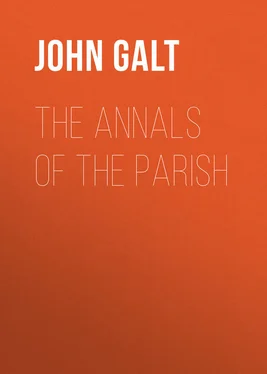John Galt - The Annals of the Parish
Здесь есть возможность читать онлайн «John Galt - The Annals of the Parish» — ознакомительный отрывок электронной книги совершенно бесплатно, а после прочтения отрывка купить полную версию. В некоторых случаях можно слушать аудио, скачать через торрент в формате fb2 и присутствует краткое содержание. Жанр: foreign_antique, foreign_prose, на английском языке. Описание произведения, (предисловие) а так же отзывы посетителей доступны на портале библиотеки ЛибКат.
- Название:The Annals of the Parish
- Автор:
- Жанр:
- Год:неизвестен
- ISBN:нет данных
- Рейтинг книги:3 / 5. Голосов: 1
-
Избранное:Добавить в избранное
- Отзывы:
-
Ваша оценка:
- 60
- 1
- 2
- 3
- 4
- 5
The Annals of the Parish: краткое содержание, описание и аннотация
Предлагаем к чтению аннотацию, описание, краткое содержание или предисловие (зависит от того, что написал сам автор книги «The Annals of the Parish»). Если вы не нашли необходимую информацию о книге — напишите в комментариях, мы постараемся отыскать её.
The Annals of the Parish — читать онлайн ознакомительный отрывок
Ниже представлен текст книги, разбитый по страницам. Система сохранения места последней прочитанной страницы, позволяет с удобством читать онлайн бесплатно книгу «The Annals of the Parish», без необходимости каждый раз заново искать на чём Вы остановились. Поставьте закладку, и сможете в любой момент перейти на страницу, на которой закончили чтение.
Интервал:
Закладка:
I wrote the letter that night to Provost Maitland, and, by the retour of the post, I got an answer, with twenty pounds for Mrs. Malcolm, saying, “That it was with sorrow he heard so small a trifle could be serviceable.” When I took the letter and the money, which was in a bank-bill, she said, “This is just like himsel’.” She then told me that Mr. Maitland had been a gentleman’s son of the east country, but driven out of his father’s house, when a laddie, by his stepmother; and that he had served as a servant lad with her father, who was the Laird of Yillcogie, but ran through his estate, and left her, his only daughter, in little better than beggary with her auntie, the mother of Captain Malcolm, her husband that was. Provost Maitland in his servitude had ta’en a notion of her; and when he recovered his patrimony, and had become a great Glasgow merchant, on hearing how she was left by her father, he offered to marry her, but she had promised herself to her cousin the captain, whose widow she was. He then married a rich lady, and in time grew, as he was, Lord Provost of the city; but his letter with the twenty pounds to me, showed that he had not forgotten his first love. It was a short, but a well-written letter, in a fair hand of write, containing much of the true gentleman; and Mrs. Malcolm said, “Who knows but out of the regard he once had for their mother, he may do something for my five helpless orphans.”
Thirdly, Upon the subject of taking my cousin, Miss Betty Lanshaw, for my first wife, I have little to say. – It was more out of a compassionate habitual affection, than the passion of love. We were brought up by our grandmother in the same house, and it was a thing spoken of from the beginning, that Betty and me were to be married. So, when she heard that the Laird of Breadland had given me the presentation of Dalmailing, she began to prepare for the wedding; and as soon as the placing was well over, and the manse in order, I gaed to Ayr, where she was, and we were quietly married, and came home in a chaise, bringing with us her little brother Andrew, that died in the East Indies, and he lived and was brought up by us.
Now, this is all, I think, that happened in that year worthy of being mentioned, except that at the sacrament, when old Mr. Kilfuddy was preaching in the tent, it came on such a thunder-plump, that there was not a single soul stayed in the kirkyard to hear him; for the which he was greatly mortified, and never after came to our preachings.
CHAPTER II
YEAR 1761
It was in this year that the great smuggling trade corrupted all the west coast, especially the laigh lands about the Troon and the Loans. The tea was going like the chaff, the brandy like well-water, and the wastrie of all things was terrible. There was nothing minded but the riding of cadgers by day, and excisemen by night – and battles between the smugglers and the king’s men, both by sea and land. There was a continual drunkenness and debauchery; and our session, that was but on the lip of this whirlpool of iniquity, had an awful time o’t. I did all that was in the power of nature to keep my people from the contagion: I preached sixteen times from the text, “Render to Cæsar the things that are Cæsar’s.” I visited, and I exhorted; I warned, and I prophesied; I told them that, although the money came in like sclate stones, it would go like the snow off the dyke. But for all I could do, the evil got in among us, and we had no less than three contested bastard bairns upon our hands at one time, which was a thing never heard of in a parish of the shire of Ayr since the Reformation. Two of the bairns, after no small sifting and searching, we got fathered at last; but the third, that was by Meg Glaiks, and given to one Rab Rickerton, was utterly refused, though the fact was not denied; but he was a termagant fellow, and snappit his fingers at the elders. The next day he listed in the Scotch Greys, who were then quartered at Ayr, and we never heard more of him, but thought he had been slain in battle, till one of the parish, about three years since, went up to London to lift a legacy from a cousin that died among the Hindoos. When he was walking about, seeing the curiosities, and among others Chelsea Hospital, he happened to speak to some of the invalids, who found out from his tongue that he was a Scotchman; and speaking to the invalids, one of them, a very old man, with a grey head and a leg of timber, inquired what part of Scotland he was come from; and when he mentioned my parish, the invalid gave a great shout, and said he was from the same place himself; and who should this old man be, but the very identical Rab Rickerton, that was art and part in Meg Glaiks’ disowned bairn. Then they had a long converse together, and he had come through many hardships, but had turned out a good soldier; and so, in his old days, was an indoor pensioner, and very comfortable; and he said that he had, to be sure, spent his youth in the devil’s service, and his manhood in the king’s, but his old age was given to that of his Maker, which I was blithe and thankful to hear; and he enquired about many a one in the parish, the blooming and the green of his time, but they were all dead and buried; and he had a contrite and penitent spirit, and read his Bible every day, delighting most in the Book of Joshua, the Chronicles, and the Kings.
Before this year, the drinking of tea was little known in the parish, saving among a few of the heritors’ houses on a Sabbath evening; but now it became very rife: yet the commoner sort did not like to let it be known that they were taking to the new luxury, especially the elderly women, who, for that reason, had their ploys in out-houses and by-places, just as the witches lang syne had their sinful possets and galravitchings; and they made their tea for common in the pint-stoup, and drank it out of caps and luggies, for there were but few among them that had cups and saucers. Well do I remember one night in harvest, in this very year, as I was taking my twilight dauner aneath the hedge along the back side of Thomas Thorl’s yard, meditating on the goodness of Providence, and looking at the sheaves of victual on the field, that I heard his wife, and two three other carlins, with their Bohea in the inside of the hedge, and no doubt but it had a lacing of the conek, 3 3 Cognac.
for they were all cracking like pen-guns. But I gave them a sign, by a loud host, that Providence sees all, and it skailed the bike; for I heard them, like guilty creatures, whispering, and gathering up their truck-pots and trenchers, and cowering away home.
It was in this year that Patrick Dilworth (he had been schoolmaster of the parish from the time, as his wife said, of Anna Regina, and before the Rexes came to the crown), was disabled by a paralytic, and the heritors, grudging the cost of another schoolmaster as long as he lived, would not allow the session to get his place supplied, which was a wrong thing, I must say, of them; for the children of the parishioners were obliged, therefore, to go to the neighbouring towns for their schooling, and the custom was to take a piece of bread and cheese in their pockets for dinner, and to return in the evening always voracious for more, the long walk helping the natural crave of their young appetites. In this way Mrs. Malcolm’s two eldest laddies, Charlie and Robert, were wont to go to Irville, and it was soon seen that they kept themselves aloof from the other callans in the clachan, and had a genteeler turn than the grulshy bairns of the cottars. Her bit lassies, Kate and Effie, were better off; for some years before, Nanse Banks had taken up a teaching in a garret-room of a house, at the corner where John Bayne has biggit the sclate-house for his grocery-shop. Nanse learnt them reading and working stockings, and how to sew the semplar, for twal-pennies a-week. She was a patient creature, well cut out for her calling, with blear een, a pale face, and a long neck, but meek and contented withal, tholing the dule of this world with a Christian submission of the spirit; and her garret-room was a cordial of cleanliness, for she made the scholars set the house in order, time and time about, every morning; and it was a common remark for many a day, that the lassies, who had been at Nanse Banks’s school, were always well spoken of, both for their civility, and the trigness of their houses when they were afterwards married. In short, I do not know, that in all the long epoch of my ministry, any individual body did more to improve the ways of the parishioners, in their domestic concerns, than did that worthy and innocent creature, Nanse Banks, the schoolmistress; and she was a great loss when she was removed, as it is to be hoped, to a better world; but anent this I shall have to speak more at large hereafter.
Читать дальшеИнтервал:
Закладка:
Похожие книги на «The Annals of the Parish»
Представляем Вашему вниманию похожие книги на «The Annals of the Parish» списком для выбора. Мы отобрали схожую по названию и смыслу литературу в надежде предоставить читателям больше вариантов отыскать новые, интересные, ещё непрочитанные произведения.
Обсуждение, отзывы о книге «The Annals of the Parish» и просто собственные мнения читателей. Оставьте ваши комментарии, напишите, что Вы думаете о произведении, его смысле или главных героях. Укажите что конкретно понравилось, а что нет, и почему Вы так считаете.












